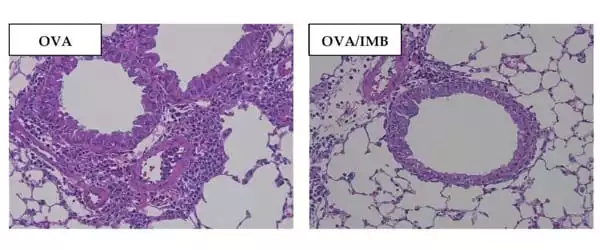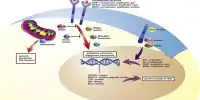Bronchial asthma is characterized by chronic inflammation of the airways, which leads to significant impairment of lung function over time. As of now, there is no cure for asthma, and only the symptoms can be relieved with the available treatment options.
Researchers at Osaka City University discovered that a fermented soy product called ImmuBalance reduces inflammation of the airways in animal models of asthma. The study’s findings can be found in the English-language specialist journal “Nutrients.”
In an animal model, researchers discovered that ImmuBalance, a fermented soybean product, is effective in suppressing airway inflammation caused by asthma. The presence of eosinophils in bronchoalveolar lavage fluid was reduced, mucus production in the bronchial epithelium was reduced, and proteins that induce eosinophilic inflammation were suppressed.
The relationship between soy intake and allergic diseases has previously been epidemiologically reported, suggesting that the components of soy may have some anti-allergic effects.”
Hideaki Kadotani
Bronchial asthma is characterized by symptoms such as wheezing and coughing as a result of chronic airway inflammation, but there is no effective treatment, leaving room for new prevention and treatment methods. A new study finds that ImmuBalance, a fermented soy product, reduces airway inflammation in animal models of asthma.
Researchers from Osaka City University Graduate School of Medicine discovered that in an ImmuBalance-treated group of asthma model mice, white blood cells known as eosinophils were significantly reduced in the bronchoalveolar lavage fluid (BALF). In addition to a reduction in inflammation and mucus around the bronchi, the researchers discovered a suppression of proteins that cause eosinophilic inflammation.
“The relationship between soy intake and allergic diseases has previously been epidemiologically reported,” said Hideaki Kadotani, the study’s first author, “suggesting that the components of soy may have some anti-allergic effects.”
“It has been reported that gut microbiota imbalances may be involved in the immune system and allergic diseases, and fermented dietary fiber, such as that found in soy, may have beneficial effects in allergic asthma models.” Associate Professor Kazuhisa Asai, a study co-author, continues.
According to the researchers, there is an increased interest in new prevention and treatment methods because there is still no basic treatment for bronchial asthma. In addition, the “connection between soy consumption and allergic diseases has previously been investigated epidemiologically, with the results indicating that the components of soy may have anti-allergic effects,” according to study author Hideaki Kadotani of Osaka City University in a press release.

Furthermore, previous research has shown that imbalances in the intestinal microbiota (intestinal flora) can be involved in the immune system and allergic diseases, and that fermented fiber, such as that found in soy, may be beneficial in allergic asthma.
The effects of such an imbalance on asthma were investigated in the study by feeding ImmuBalance-enriched feed to asthma model mice. The number of eosinophils in BALF was significantly reduced in the ImmuBalance-treated group, as was inflammation around the bronchi and mucus production in the bronchial epithelium. The expression of Th2 cytokines and immunoglobulin serum IgE, both of which induce eosinophilic inflammation in BALF, was also measured and found to be significantly suppressed when compared to mice fed a normal diet.
The current study looked at the effects of the fermented soy product ImmuBalance on asthmatic mice. According to the researchers, the asthma-associated white blood cells (eosinophils) in the bronchoalveolar lavage fluid (BALF) were significantly reduced in the ImmuBalance group, as was inflammation and mucus production in the bronchi.
Proteins that cause eosinophilic inflammation have also been shown to be suppressed. According to the experts, the expression of Th2 cytokines and the immunoglobulin IgE in serum, which causes eosinophilic inflammation in the BALF, was significantly reduced when compared to animals fed a normal diet.
“Steroid inhalants are the foundation of asthma treatments in clinical practice, but they are known to have adverse side effects,” says Professor Tomoya Kawaguchi, the study’s lead advisor. “Our findings suggest that consumption of fermented soybean products should be recommended as complementary asthma coping strategy with fewer side effects.” These findings were published in the journal Nutrients.














